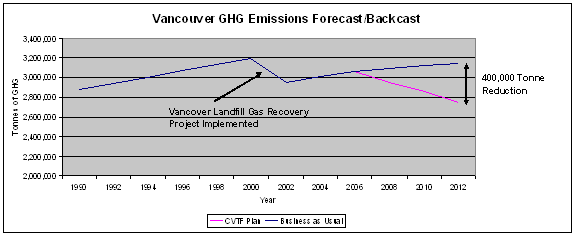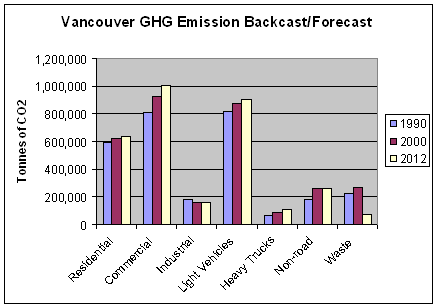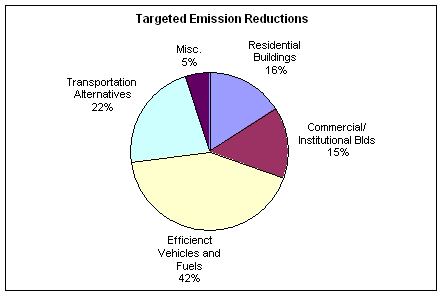|
CITY OF VANCOUVER ADMINISTRATIVE REPORT |
Date: |
January 18, 2005 | |
Author: |
Thomas Osdoba | |
Phone No.: |
604.871.6677 | |
RTS No.: |
4810 | |
CC File No.: |
3752 | |
Meeting Date: |
February 3, 2005 |
TO: |
Standing Committee on City Services and Budgets |
FROM: |
Sustainability Group |
SUBJECT: |
2005 Budget Initiative - Office of Sustainability |
RECOMMENDATION
A. THAT Council receive for INFORMATION the report on new funding for the Sustainability Group for implementing the Community Climate Change Action Plan (CCAP), developed by the Cool Vancouver Task Force. Funding for the Community CCAP would provide $960,000 for five full-time positions, subject to review and classification by Human Resources, and program operations funds to carry out implementation through 2012, approval to be deferred to the 2005 Interim Operating Budget.
B. THAT Council further receive for INFORMATION the request for two permanent, full-time positions in the Sustainability Group, subject to review and classification by Human Resources - one to coordinate and support multiple major projects and a permanent clerk to replace the temporary position about to end. The cost of these two positions, prorated for 2005, are net salaries and benefits of $121,153, approval and funding to be deferred to the 2005 Interim Operating Budget. The annual estimate is net salaries and benefits of $150,4426.
C. THAT Council consider this Program and Budget Overview in advance of receiving the completed Community CCAP, which is scheduled to be delivered to Council on March 2005. Sustainability Group staff are preparing a Council Workshop and subsequent Council Report to provide an in-depth review of the Community CCAP.
CITY MANAGER'S COMMENTS
The City Manager puts recommendations A, B and C forward as part of the Council's 2005 Operating Budget.
COUNCIL POLICY
On October 16, 1990, Council approved in principle Clouds of Change Recommendation #1 to reduce carbon dioxide emissions by 20% as part of the actions to address global climate change issues, subject to future reports on costs and trade-offs involved in achieving the objectives and targets.
In 1995, Vancouver joined the Federation of Canadian Municipalities' "20% Club", which became the Partners for Climate Protection Program in 1998.
Council has adopted the Vancouver Transportation Plan (1997), Downtown Vancouver Transportation Plan (2002) and Vancouver Transit Strategy (2002), which generally require transit and other non-auto modes to accommodate future increases in travel demand. The City supports maintaining peak road capacity from the region at no more than the present level, with no further significant investment to expand motor vehicle capacity into Vancouver.
On April 23, 2002, Council adopted a Definition and Principles of Sustainability to guide, prioritize, and improve the sustainability of City actions and operations.
On May 2, 2002, Council carried the motion, proposed by the Federation of Canadian Municipalities, to support the Canadian Government's ratification of the Kyoto Protocol.
On March 25, 2003, Council approved an emissions reduction target of 20% from 1990 levels for the corporation of the City of Vancouver, subject to evaluation of the implications of the target to ensure it is realistic. On this same date, Council created the Cool Vancouver Task Force and requested that it report back with a report on the components of a Greenhouse Gas Reduction Action Plan for both the corporation and the community.
On June 24, 2003, Council received the Cool Vancouver Task Force's Discussion Paper on Greenhouse Gas Reduction Planning and approved (in principle) a target of 6% below 1990 emissions levels for the city (community) as a whole, subject to evaluation of the implications of the target to ensure it is realistic. Council also approved a process to develop GHG Reduction Plans for both the City (Corporate) and the Community and approved $30,000 for technical support for the development of these plans.
On December 2, 2003, Council unanimously approved the Corporate Climate Change Action Plan as proposed from the Cool Vancouver Task Force, affirming the target of a 20% reduction from 1990 levels by 2010 of emissions from the City's own operations and facilities. On this same date, Council approved funding $50,000 for a consultation process for the Community Climate Change Action Plan, as well as another $30,000 for technical expertise to support the consultation process.
On April 28, 2004, Council received the draft Community Climate Change Action Plan from the Cool Vancouver Task Force, and directed the Sustainability Group staff to engage in extensive public consultation on the draft, both with stakeholders and the community.
BACKGROUND
Program and Budget Overview
Vancouver's Community Climate Change Action Plan (CCAP) presents a comprehensive, systematic approach to the challenge of climate change. The emissions reduction goal from the Kyoto Protocol of six percent below 1990 levels by 2012 now means a reduction of over a quarter of our current emissions, or about 400,000 tonnes per year.
In response to the challenge, the Community CCAP lays out a multifaceted program aimed at motivating and helping people and businesses contribute to meaningful changes, and takes into account the appropriate and anticipated actions of federal and provincial government. Vancouver is presenting a plan that would represent international leadership. Pursuit of this CCAP would not only begin the process of addressing our obligation to the world community, but also bring about changes that enhance the economic, ecological and social vitality of the City. In developing this CCAP, the Cool Vancouver Task Force has provided a vital forum for discussion and program development. In addition, extensive public consultation efforts have enlisted the energy of many Vancouver residents and business representatives.
The plan summarized in this budget overview is a reasonable and realistic beginning. Our program initiatives and their corresponding resource needs balance the dual challenges of pragmatism and program innovation. This overview provides an introduction to the specific emissions reduction goals for and fundamental information about each of the elements, the proposed strategies for attaining the goals, and identifies the staff and resource needs to pursue those strategies. We have been able to identify substantial funding partnerships to help to launch the plan, and those funds are identified along with the net City contribution.
DISCUSSION
Cool Vancouver - The Challenge
The Community CCAP outlines how Vancouver as a community can reduce its Greenhouse Gas (GHG) emissions as follows:
· Return to its 1990 levels of emissions by 2010; and
· Achieve a 6% reduction below 1990 levels by 2012.

Meeting our emission reduction target means that we must reduce our forecasted annual GHG emissions by 400,000 tonnes between now and 2012.
Based on available data, the following chart illustrates where the GHG emissions come from in Vancouver. As noted, the large majority of emissions come from buildings and cars ("light vehicles" includes automobiles, small trucks, sport utility vehicles, minivans).

In March 2005, the Sustainability Group is scheduled to present the CCAP to Council in detail, and will allow for additional discussion of the CCAP contents beyond the budgetary elements described in this Report.
The CCAP consists of initiatives based on the following elements:
· Community Outreach
· Residential Buildings
· Commercial Buildings
· Community Energy Systems
· Transportation Alternatives
· Fleets and Vehicles
As illustrated in the following chart, the CCAP targets transportation and building energy use as the primary areas for achieving GHG emission reductions. Nearly two thirds of the targeted emissions reductions, or about 250,000 tonnes, would come through transportation-related initiatives.

BUDGET SUMMARY FOR COMMUNITY CLIMATE CHANGE ACTION PLAN
Program elements |
Annual Cost |
2005 Cost |
External
|
2005 CoV Budget |
Community Outreach |
$675,000 |
$515,000 |
$130,000 |
$385,000 |
Residential Buildings |
$280,000 |
$275,000 |
$165,000 |
$110,000 |
Commercial Buildings |
$165,000 |
$150,000 |
$35,000 |
$115,000 |
Community Energy Systems |
$100,000 |
$287,500 |
$180,000 |
$107,500 |
Transportation Alternatives |
$742,000 |
$727,000 |
$592,000 |
$135,000 |
Fuels & Efficient Vehicles |
$120,000 |
$107,500 |
$107,500 | |
TOTALS |
$2,082,000 |
$2,062,000 |
$1,102,000 |
$960,000 |
This summary table for the Community CCAP budget request provides:
· Our estimate of the "Annual Cost" for staff and implementation;
· The "2005 Cost" for the first-year costs, considering partial-year salaries and program operations, and some one-time start-up costs;
· "External Funding" to support the program; and
· "2005 City of Vancouver Budget" request of funding needed through this request.
The following pages provide budget details for staff and program costs for each of the CCAP elements.
Community Outreach | ||||||
Goal
| ||||||
Strategies · Create and effectively communicate a compelling community vision for Vancouver that combines individual interests and passions with desirable behavioural norms
| ||||||
Program elements · Outreach Coordinator
| ||||||
Program elements |
Annual Cost |
2005 Cost |
External
|
2005 CoV Budget | ||
Outreach Coordinator (1 FTE) |
$60,000 |
$60,000 |
$60,000 |
$0 | ||
Community Grants & Awards |
$210,000 |
$115,000 |
$55,000 |
$60,000 | ||
Events |
$150,000 |
$100,000 |
$100,000 | |||
Materials - Printing & Production |
$35,000 |
$35,000 |
$35,000 | |||
Media Communications |
$180,000 |
$185,000 |
$15,000 |
$170,000 | ||
Consulting and Research |
40,000 |
20,000 |
20,000 | |||
TOTALS |
$675,000 |
$515,000 |
$130,000 |
$385,000 | ||
Residential Buildings |
Goal Reduce annual GHG emissions from existing detached and multifamily homes by 65,000t · 20% of detached housing improve energy efficiency by 25% through retrofits
and do-it-yourself improvements · Retrofit non-market housing to improve efficiency by 15%
|
Strategies · Develop a user-focused information resource and marketing campaign in partnership with other public and private organizations to highlight home energy efficiency opportunities, explain how to locate quality goods and services, how to undertake small incremental improvements, and where they can access grants, and financing
|
Program elements · Residential Buildings energy staff
|
Program elements |
Annual Cost |
2005 Cost |
External
|
2005 CoV Budget |
Residential Buildings Energy Staff (1.0 FTE) |
$100,000 |
$50,000 |
$50,000 | |
Development and Maintenance of Program and Marketing Materials |
$30,000 |
$130,000 |
$115,000 |
$15,000 |
Incentives |
$150,000 |
$75,000 |
$50,000 |
$25,000 |
Analysis of Regulatory Options |
$0 |
$20,000 |
$20,000 | |
TOTALS |
$280,000 |
$275,000 |
$165,000 |
$110,000 |
Commercial and Institutional Buildings | ||||||
Goal Reduce annual GHG emissions from commercial and institutional buildings by 50,000t · 25% of medium and large commercial buildings improve efficiency by 15% through retrofits and equipment replacement
| ||||||
Strategies · Create a market for energy efficient commercial spaces through a third-party administered energy efficiency improvement recognition program similar to BOMA's "Go Green" or LEED
| ||||||
Program elements · Commercial/Institutional Buildings energy staff
| ||||||
Program elements |
Annual Cost |
2005 Cost |
External
|
2005 CoV Budget | ||
C/I Buildings Energy Staff (1.0 FTE) |
$100,000 |
$50,000 |
$50,000 | |||
Research and Business Case Development |
$50,000 |
$50,000 |
$50,000 | |||
Resource Development and Promotion |
$15,000 |
$50,000 |
$35,000 |
$15,000 | ||
TOTALS |
$165,000 |
$150,000 |
$35,000 |
$115,000 | ||
Community Energy Systems & Supply |
Goal
· Decrease emissions significantly in the long run
|
Strategies · Technology and systems research heating, cooling and electricity
|
Program elements · Energy Systems Staff (0.5 FTE)
|
Program elements |
Annual Cost |
2005 Cost |
External
|
2005 CoV Budget |
Energy Systems Staff (0.5 FTE) |
$50,000 |
$37,500 |
$37,500 | |
Feasibility Research and Analysis |
$25,000 |
$100,000 |
$75,000 |
$25,000 |
Business Case Development |
$25,000 |
$150,000 |
$105,000 |
$45,000 |
TOTALS |
$100,000 |
$287,500 |
$180,000 |
$107,500 |
Transportation Alternatives |
Goal Reduce annual GHG emissions from light duty vehicles by 90,000t |
Strategies · Maximize transit service improvements through the Transit Area Planning process, medium term bus system improvements, close cooperation on transit street and signal priority, and improved bus loading approaches
|
Program elements · Transportation Alternatives Staff
|
Program elements |
Annual Cost |
2005 Cost |
External
|
2005 CoV Budget |
Transportation Alternatives Staff (1 FTE) |
$100,000 |
$50,000 |
$50,000 | |
Clean Trips to School Pilot Program |
$330,000 |
$330,000 |
$330,000 |
$0 |
Transportation Demand Management · TravelSmart Pilot Expansion
|
$262,000 |
$262,000
|
$262,000 |
$0
|
Research and Consulting Support |
$50,000 |
$85,000 |
$85,000 | |
TOTALS |
$742,000 |
$727,000 |
$592,000 |
$135,000 |
Fuel and Vehicle Efficiency |
Goal Reduce annual GHG emissions from vehicles by 199,000t |
Strategies · Include fuel economy and efficient operation in outreach messaging and tools
|
Program elements · Fuels and Efficient Vehicles Staff
|
Program elements |
Annual Cost |
2005 Cost |
External
|
2005 CoV Budget |
Fuels & Efficient Vehicle Staff (0.5 FTE) |
$50,000 |
$37,500 |
$37,500 | |
Market Transformation Projects |
$50,000 |
$50,000 |
$50,000 | |
Research and Technical Support |
$20,000 |
$20,000 |
$20,000 | |
TOTALS |
$120,000 |
$107,500 |
$107,500 |
PERSONNEL IMPLICATIONS
As noted above, the CCAP would provide for 5 new full-time positions to implement the Plan throughout the community. These positions would be permanent through 2012. In addition, this initiative would provide for two additional permanent, full-time positions within the Sustainability Group. One would lead and coordinate major sustainability projects throughout Vancouver, while the other would provide a permanent clerk to replace the temporary position now ending.
FINANCIAL IMPLICATIONS
Sustainability Group - New Budget Items |
New Staff Positions |
2005 CoV Budget |
|
Community Climate Change Action Plan · Community Outreach
|
5.0
|
$960,000
|
|
Sustainability Group Staffing · Major Projects Coordinator
|
2.0
|
$ 121,153
|
TOTALS |
7.0
|
$1,081,153 |
The Sustainability Group is requesting $960,000 for the Community CCAP, which includes 5 permanent, full-time positions through 2012. As shown in the following table, the annual net salaries and benefits of the five positions are estimated at $460,000, and the prorated share for 2005 is $225,000.

In developing this budget request, we have begun to pursue and anticipate leveraging an additional $1,102,000 in external funding from various partners, making the total program for 2005 about $2,062,000. One major element of this external funding is pending an imminent decision from the Federal Treasury Board to provide Vancouver $760,000 in "Opportunities Envelope" program funding for the Community CCAP. The City anticipates hearing the results of this decision in early February, and that the probability of receiving the funding is quite high. However, if this funding is not provided, staff have considered options of not pursuing these activities or doing so on a smaller scale. If a decision is made to proceed with these elements, staff would make every effort to identify other potential external funding sources.
The Community CCAP represents a major new program initiative. Staff have attempted to craft a workable budget, based on our estimate of what resources are needed to have a significant impact on helping residents and businesses to make behaviour changes that reduce GHG emissions. Several program elements will have significant start-up costs, but then on-going resource needs will be lower. Other elements will take a year to ramp up into fully functioning activities, so first year costs will be lower than in subsequent years. Our funding request in this Report is quite precise as to what we expect we would need for 2005, the annual on-going resource need is still quite tentative. With this request, staff think that we are close to what the on-going, annual resource needs are, but we will need to monitor our activities closely and work with other City departments and external partners to fine tune our budget in future years.
The Sustainability Group also is requesting two permanent, full-time positions that would not be directly involved in implementing the Community CCAP. The estimated annual cost of net salaries and benefits is $150,426, with a prorated net salaries and benefits $121,153. One position would help coordinate the extensive - and rapidly growing - list of important projects throughout Vancouver. One of the goals of the Sustainability Group is to remain a small team, and to help the whole of the City's departments, Boards, businesses and institutions embrace sustainability. To do that effectively, the City needs to provide both leadership and support, and an additional senior staff position would allow for us to address this need effectively and to assist other City staff with their efforts to integrate sustainability within their work. The permanent clerk position would provide the Sustainability Group with on-going administrative support, as the current temporary clerk position is set to end in early 2005.
CONCLUSION
This budget initiative would provide the City of Vancouver with a Climate Change Action Plan and staff to implement the program, as well as some additional support for the Sustainability Group as it begins to further develop and pursue sustainability initiatives throughout Vancouver. The CCAP, which is scheduled to be presented in detail to Council in March 2005, would establish Vancouver's leadership position in its efforts to respond to the challenges of climate change and the Kyoto Protocol.
* * * * *
